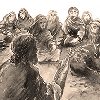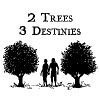The Gospel is something that reveals the righteousness, or rightness of God. The knowledge of His righteousness is instinctively know to mankind:
“…because that which is known about God is evident within them; for God made it evident to them. For since the creation of the world His invisible attributes, His eternal power and divine nature, have been clearly seen, being understood through what has been made, so that they are without excuse.”
(Romans 1:19-20)
The Conscience
In verse 18, Paul says that the truth they suppress is something that is evident within them (for God has made it so). It is an inborn understanding of God’s invisible attributes, His eternal power and divine nature. Not only is that knowledge known deep within each one of us, but it is also substantiated through what has been made. Nature clearly reflects the righteous character of God.
on that day the secrets of men’s hearts would be fully exposed – being made evident by their deeds.1Revelation 20:11-15
Is this “truth” that is revealed to them speaking of John 3:16? Is that what is known about God innately? Not according to Romans 10:14 and 17 —
How then shall they call upon Him in whom they have not believed? And how shall they believe in Him whom they have not heard? And how shall they hear without a preacher? … So faith comes from hearing, and hearing by the word of Christ.
(Romans 10:14,17)
So John 3:16 is not instinctively known, but has to be heard. So what kind of knowing could they innately have of God and how could they honor Him as God according to that knowing? There is a requirement put upon men based on knowledge they are born with, apart from John 3:18 (active disbelief). There, Jesus said that the one who has not believed in Him is judged already. But Paul would ask, “How can they believe if they haven’t heard?” Not believing indicates a conscious rejection of something that has been clearly presented — it is understandable that God would hold one accountable for that. However, to say that God would hold accountable those who have not heard the message from a reputable source conceals, rather than reveals, the righteousness of God — taking away the power of the gospel.
The gospel derives its power from the fact that it reveals His righteousness to man. When that is revealed, the heart of those who have a will to do His will is captured and the love affair begins. It is the love that produces 2 Corinthians 5:14,15. The innate knowledge that Paul was talking about in Romans 1 is referred to in chapter 2 as the conscience — the law written in men’s hearts as to what is good and evil, and also a witness to their deeds. Since God put the conscience in us, when we obey that inner voice, we honor Him.
For when Gentiles who do not have the Law do instinctively the things of the Law, these, not having the Law, are a law to themselves, in that they show the work of the Law written in their hearts, their conscience bearing witness, and their thoughts alternately accusing or else defending them…
(Romans 2:14-15)
The ones Romans 1:25 is talking about exchange that truth for a lie that suits them better at the moment, allowing them to do what they want, rather than what they know to be right. They elevate themselves to the stature of their Creator, saying in their hearts that there is no one greater to determine what is right and wrong than they themselves. They say in their hearts, “There is no God,” becoming the fools that King David wrote of in Psalm 14:1,
The fool has said in his heart, “There is no God.” They are corrupt, they have done abominable works; there is none who does good.
(Psalm 14:1)
Can one honestly say that there is no difference in the eyes of God between a terrorist and a hard-working farmer who wears himself out in his struggle to feed his family? Will God send them both to the same eternal destiny of the Lake of Fire simply because he never heard the Gospel? This is certainly not the impression of God that Abraham had when he pled for the lives of the few righteous in Sodom:
Far be it from You to do such a thing, to slay the righteous with the wicked, so that the righteous and the wicked are treated alike. Far be it from Thee… Shall not the Judge of all the earth deal justly?
(Genesis 18:25)
The Judgment
These considerations start to give understanding of the final judgment:
And I saw a great white throne and Him who sat upon it… And I saw the dead, the great and the small, standing before the throne, and books were opened; and another book was opened, which is the book of life; and the dead were judged from the things which were written in the books, according to their deeds. …and death and Hades gave up the dead which were in them; and they were judged, every one of them according to their deeds. And death and Hades were thrown into the lake of fire. This is the second death, the lake of fire. And if anyone’s name was not found written in the book of life, he was thrown into the lake of fire.
(Revelation 20:11-15)
This judgment is based on deeds. Books are opened, which are the individual records of a person’s deeds as recorded in his conscience. It is according to each one’s deeds, not religious beliefs. On that basis, a person’s name is either kept in or erased from the book of life. What we see in Revelation 20:12-15 is the separation of two types or categories of people. They are all outside of the realm of John 3:18, having never been faced with the opportunity in John
5:25.
Those who stand in the final judgment are the ones spoken of in John 5:28,
Do not marvel at this; for an hour is coming, in which all who are in the tombs will hear His voice, and will come forth; those who did the good deeds to a resurrection of life, those who committed the evil deeds to a resurrection of judgment.
(John 5:28)
So there are two categories of man clearly described in the judgment of Revelation 20, each with its own destiny. Those having the righteousness of man, living according to the inborn knowledge of good and evil, will go to a second (eternal) life in the nations of eternity (Revelation 21:24,26; 22:2). Those who hated all righteousness (the filthy and unjust) will have as their eternal destiny a part in the Lake of Fire, which is the second (eternal) death.2Revelation 21:8
The Righteousness of Man and the Righteousness of God
The people of the nations must struggle to live according to the voice of their conscience and uphold the righteous standard within themselves. Jesus mentioned them in Matthew 6:31-32 but was not condemning the Gentiles for their anxiety to provide food and clothing for themselves and their families. He knew it is a normal part of life — they have no choice but to consume themselves with getting what they need for survival. The issue for them is how they go about it.
Therefore do not be anxious, saying, ‘What shall we eat?’ or ‘What shall we drink?’ or ‘What shall we wear?’ For the Gentiles seek after all these things, and your heavenly Father knows that you need them all.
(Matthew 6:31-32)
Matthew 6:31-32 is not for the nations; rather, it was given as a standard to those who wanted to follow Jesus. To them He said, “Seek first the kingdom of God and His righteousness.” They were called to a higher dimension of righteousness than those locked in the struggle of working for what they need to live. They were called to partake in His righteousness by trusting and obeying Him completely. These are His holy people — those wholly devoted to bringing about the purpose of God on the earth — a witness of His righteousness.
And all who believed were together and had all things in common. And they were selling their possessions and belongings and distributing the proceeds to all, as any had need.
(Acts 2:44-45)
Such was the life recorded in Acts (especially chapters 2 & 4). The life of serving one another to meet each other’s needs rather than one’s own needs is what expresses His righteousness. This love between them was the sign that they belonged to Him. After all, isn’t that why He died?32 Corinthians 5:14-15,21
Now the full number of those who believed were of one heart and soul, and no one said that any of the things that belonged to him was his own, but they had everything in common. And with great power the apostles were giving their testimony to the resurrection of the Lord Jesus, and great grace was upon them all. There was not a needy person among them, for as many as were owners of lands or houses sold them and brought the proceeds of what was sold and laid it at the apostles’ feet, and it was distributed to each as any had need.
(Acts 4:32-35)
Scriptural References and Other Footnotes





